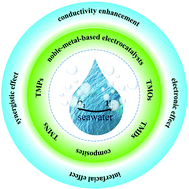Advances in hydrogen production from electrocatalytic seawater splitting
Abstract
As one of the most abundant resources on the Earth, seawater is not only a promising electrolyte for industrial hydrogen production through electrolysis, but also of great significance for the refining of edible salt. Despite the great potential for large-scale hydrogen production, the implementation of water electrolysis requires efficient and stable electrocatalysts that can maintain high activity for water splitting without chloride corrosion. Recent years have witnessed great achievements in the development of highly efficient electrocatalysts toward seawater splitting. Starting from the historical background to the most recent achievements, this review will provide insights into the current state, challenges, and future perspectives of hydrogen production through seawater electrolysis. In particular, the mechanisms of overall water splitting, key features of seawater electrolysis, noble-metal-free electrocatalysts for seawater electrolysis and the underlying mechanisms are also highlighted to provide guidance for fabricating more efficient electrocatalysts toward seawater splitting.

- This article is part of the themed collection: Recent Review Articles


 Please wait while we load your content...
Please wait while we load your content...